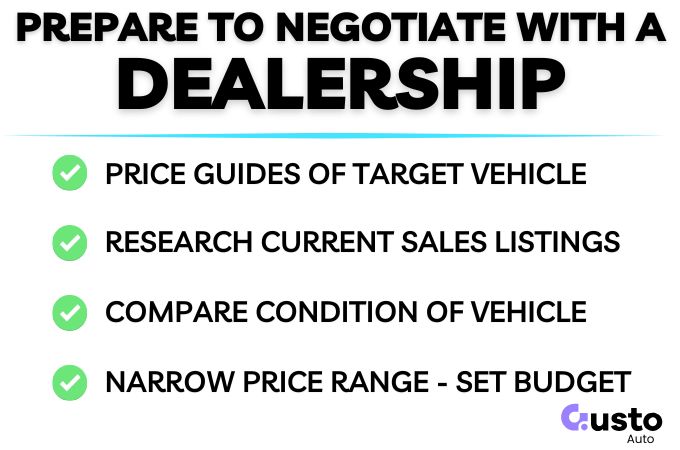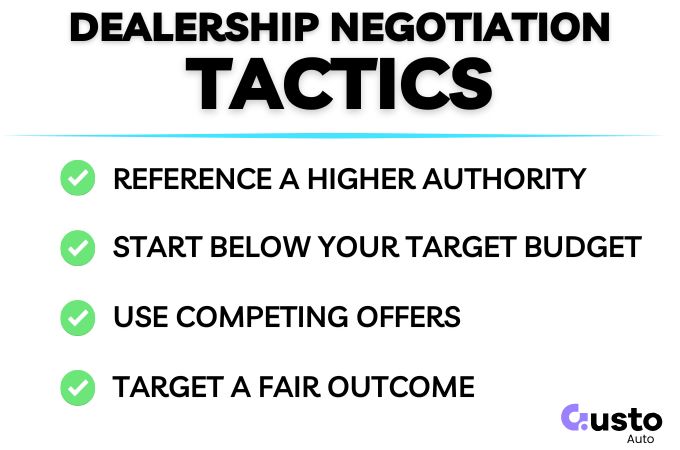When buying a used car you’ll likely know that there is going to be some room for negotiation in the price.
The real question is how you position your ask, and why a dealership would give it to you. Are you asking for a discount just because?
What happens if they just say no?
In this article, we will cover some of the basics to help you prepare to negotiate a fair outcome on your next car.
Preparing Before You Step Foot in the Dealership
A basic level of preparation can make a big difference when approaching pricing discussions.
Even if you only look up the market guide for the price of your target vehicle then you have something to anchor to that isn’t set by the dealer.
If you go in blind then the sticker price is all you have!

Researching Current Market Values
There are a number of free online resources you can use to gauge the value of your target vehicle.
You then just need to find the exact year, make, and model of the vehicle so you get the most accurate information.
Using the Redbook data as an example, you will be presented with two price ranges:
- Selling Price Range – Possible sale price for a regular sales transaction.
- Trade-in Price Range – What you could expect a dealership to offer you as an offset to buying a new vehicle if trading in.
Whether the car is at the top or bottom of the range (or even outside) depends on the KM’s on the clock, and the condition of the vehicle.
Given you are buying at a dealership you can expect the price guide to be towards the high end of the range unless the mileage is excessively high.
This is due to the investment the dealership has made in refurbishing the vehicle prior to sale. All mechanical issues will have been addressed, a roadworthy certificate obtained, and the car registered.
All much more than you could expect from a private seller who would likely do none of these to prepare for sale.
Comparing online listings and dealership offers
Once you know the general pricing guides, it is worth spending some time looking at other online listings for the same type of vehicle.
This will allow you to see how many are available nearby, and how they compare in terms of mileage, condition, and colour.
You’ll be able to quickly see how things are priced in relation to the price guide discovered in the previous step.
Armed with this knowledge you can now make a judgment on where your target vehicle sits relative to others on the market.
Knowing the fair value of your trade-in
If you also plan to trade in you current vehicle then you can repeat the previous two steps and run some extra calculations.
You will now also have an idea of the trade in value, and the net difference to aim for to complete the purchase of the new car.
Effective Negotiation Strategies That Actually Work
Now that we are armed with some knowledge we can now look at how we use it to our advantage.
The objective here is to get a fair deal for all parties and make sure that you don’t pay any more than you have to.
These strategies are easy to implement and do not require any hardball attitudes, or intimidation. Just be reasonable, logical, and base your ask on facts.

Create Space with a “Higher Power”
For many of you this will be your spouse, and if not you can refer to your parents, or any other person who is the “decision maker”.
The purpose of this is to remove any pressure on you as the sole decision maker.
It can be a powerful circuit breaker when a number is on the table and you say “just gotta check with the wife/husband/parent”.
You get time to think, and if you have another ask to make you can do so and blame the person that isn’t on-site.
Start Lower Than Your Maximum Budget
This is negotiation 101 – never start with your best offer!
However, if you throw out an unreasonably low number with no justification then you may not be considered a serious buyer and the conversation will end.
So, you are going to name a figure that is justified based on the condition of the vehicle, your pricing ranges, and what you have valued it at.
It is then up to the dealer to challenge your thinking – and even if they do, they will understand that you have done your homework.
Using Competing Offers
This is harder to do with used cars as you can only buy what is available in the market.
If you are looking for a specific vehicle then sometimes there may only be one or two available within driving distance at any one time.
Buying a brand new car makes it much easier to compare deals on offer between dealerships. There will be plenty offering exactly the same thing, so why should you buy their car if its not the best deal?
What You Can Negotiate For at the Dealership
Lower Purchase Price
So far we have focussed entirely on price. Every dollar you can get off the buy price is money that stays in your pocket!
The benefits are compounded if you are buying the car on finance. The less you borrow, the less principal that you will need to pay interest against.
Getting added extras without extra cost
Discounting is driven by a number of factors behind the scenes at a dealership. Sometimes there is just no room to move!
However, there are other things that a dealer could throw in as a sweetener to get a deal done.
Packages that include extended warranties, roadside assistance, tinted windows, or even a full tank of fuel can all be on the table.
These extras have genuine value and are worth pursuing.
Best Time to Negotiate a Used Car
Dealerships are run by salesmen – which usually means sales targets bound by deadlines.
You can use this to your advantage if you find the right salesman at the right time who needs that one extra deal to meet their sales targets for the period.
Of course, you cannot know what is going on behind the scenes. But you can tease fate out a little by targeting these windows of time:
- End of Month: If you get unusually eager service from a salesperson on the 28th of the month then something might be on the line for them. Take advantage!
- End of Financial Year: This is the big one! Sales events and time pressure are a great recipe to land a deal!
- Quiet Weekdays: Weekends are a hype of activity at some dealerships. Monday morning not so much. You become the scarce commodity on a quiet day and may be able to drive a harder bargain.
What Not to Do When Negotiating
Avoiding Aggressive or Hostile Tactics
You know the type – give me what I want or I’m walking away!!
The reality is that most sales people will shrug their shoulders and say ok.
Not only is in unpleasant to deal with, but there is no reason to accommodate a difficult costumer who is not interested in a deal that works for both parties.
While they may like to puff their chest out and brag about the amazing deal they got this one time, if there is no money in the sale for a dealership they just won’t make it.
Being an Emotional Buyer
There are thousands od used cars out there! You could even find multiple options in the one lot.
Don’t get too attached to a single car before a deal is done. Stick to your research and any variations from that should be well justified in facts about the vehicle.
Conclusion
Most people will only buy a car once every 3-7 years. So few will be well practiced in the negotiation process.
The good news is that you just don’t have to be!
All you need to know is what the car should cost according to the market. If you are in that range, and don’t have any major detractors (like very high KMs) then you know you have a fair price.
If you negotiate hard then you could get a few bucks off, and some free floor mats.

